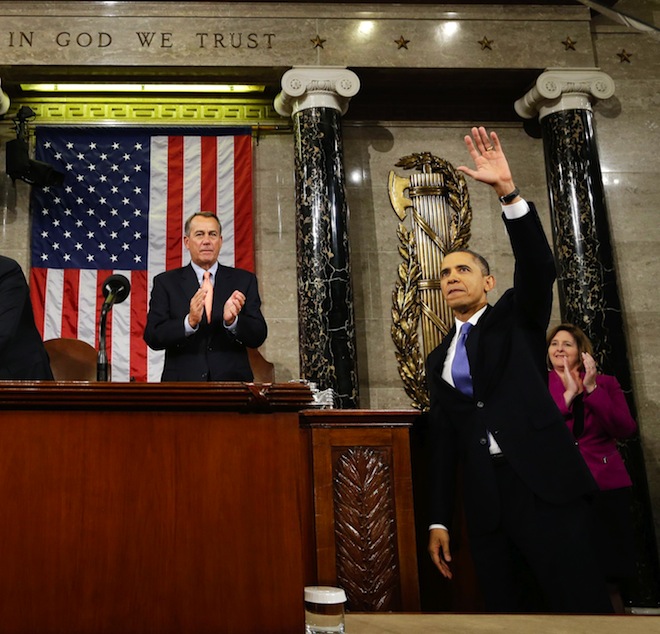The news that the Obama administration will delay by one year a requirement that large employers either provide employees affordable insurance or pay a penalty came as a surprise to Obamacare’s staunchest allies, and even to the people in government tasked with implementing other parts of the law.
It’s an undeniable fact that the so-called “employer mandate” is poorly designed and creating real challenges for businesses and workers alike. When critics of the law cite the delay as evidence of an implementation “train wreck,” in other words, they’re being tendentious, and thinking wishfully, but there’s a kernel of truth to it.
But if the employer mandate snafu were as bad and as symptomatic as Republicans would have you believe, they’d treat it as vindication — a cause for celebration. As we and others have reported, though, the employer mandate exists at the margins of the law’s core functions. The decision to delay it for a year sidelines one liability that would have harmed the law’s rollout, robs Republicans (temporarily, but during an election year) of a legitimate public critique of the law’s real-life effects, and ironically strengthens the state-based insurance exchanges, which are the must-work components of the ACA.
Thus Republicans are torn between a feeling of satisfaction that the administration has effectively copped to the employer mandate’s problems, and of frustration that a problematic provision won’t be taking effect right away, before next year’s midterm elections.
“I want to know why, after repeated assurances that everything was on track and that no more deadlines would be missed, that the Administration has taken this action,” said Rep. Kevin Brady (R-TX), the chair of the House Ways and Means Health Subcommittee, in a statement accompanying the announcement of a July 10 hearing on the delay. “It is time for the Administration to explain to the American people why it’s acceptable to grant this delay, while at the same time taking no action whatsoever to provide any relief from the individual mandate.”
Republicans like Brady are predictably using the employer mandate decision to argue that other, more consequential measures in the law — like the individual mandate — should be delayed as well. But it doesn’t take much reading between the lines to recognize what’s really going on. Republicans are still committed to the far-fetched objective of repealing Obamacare, and as such have effectively vowed not to work with the administration to fix any of its dysfunctional provisions. To the contrary, the GOP is committed to creating implementation problems where they can, and to making sure existing problems are never fixed, to make the whole program a liability for Democrats.
By delaying the employer mandate, the Obama administration unilaterally sidestepped the GOP’s strategy. And Republicans aren’t happy about it.
“This Obamacare deal just enrages me,” tweeted Josh Holmes, chief of staff to Senate Minority Leader Mitch McConnell (R-KY). “Admin frantically working to avoid accepting consequences for a disaster they created.”
In other words, even though the policy is fixable, it should be implemented as is, on schedule, so that the White House either pays a political price for it, or agrees to full repeal.
Some conservatives have even considered the possibility of taking legal action to prevent the delay, but the administration hasn’t explained the legal rationale for the decision, and even if that rationale turns out to be wanting, it’s unclear who would have standing to sue the Treasury Department.
So for now, the real outrage is trained on the delay’s substantive and political ramifications. And the dynamic can be summarized pretty simply: the employer mandate hiccup ironically increases the chances of a smooth rollout and that scrambles the GOP’s worse-is-better view of the implementation process.
Former White House budget chief Peter Orszag summed it up in a Bloomberg column on Wednesday.
“Given the major challenges associated with getting the exchanges up and running, the anxiety that the employer mandate was creating in the business community, and the minimal harm from a delay itself, the administration was wise to postpone the mandate for a year — but only if it now redoubles its focus on successful implementation of the exchanges, which are absolutely crucial to the coverage effort,” he wrote. “That would also help the administration avoid the real risk that the delay is perceived as the beginning of an unraveling of all the steps needed to carry out the law.”






